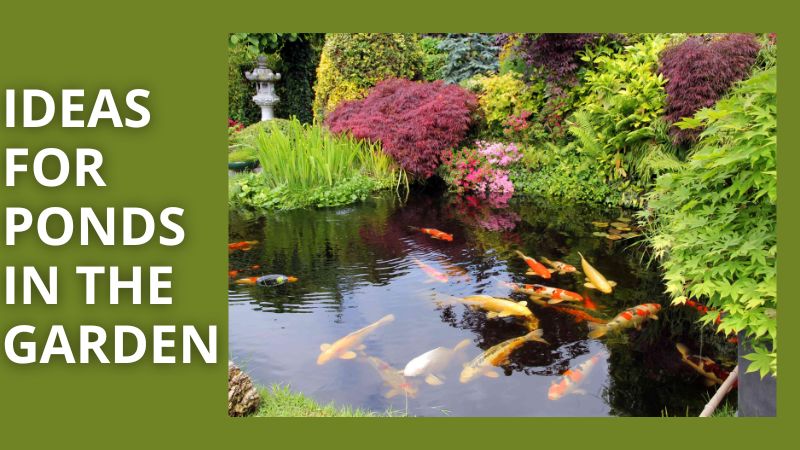GARDEN DECORATION
Top 9 Inspiring Ideas for Ponds in the Garden: From Small to Large
Creating a pond in your garden can transform your outdoor space into a tranquil oasis filled with the soothing sounds of water, vibrant wildlife, and stunning natural beauty. Ponds can vary greatly in size and style, from tiny water features to expansive backyard lakes, and they can serve various purposes, including aesthetics, wildlife habitats, and recreational areas. Whether you have a sprawling backyard or a compact garden, there are numerous ways to incorporate a pond into your landscape design. Here are 9 ideas for ponds in the garden that cater to both small and large spaces that Floral Garden Ideas would like to introduce to you.
Top 9 Inspiring Ideas for Ponds in the Garden
Container Water Gardens
For those with limited space or a smaller garden, container water gardens offer a fantastic solution. Using large pots or containers, you can create a mini pond filled with aquatic plants and perhaps a few goldfish or snails. Choose a container that complements your garden’s aesthetic and fill it with water, soil, and suitable plants such as water lilies or floating ferns. This low-maintenance option can be placed on a patio, balcony, or any small area where you want to add a splash of nature.
Naturalistic Ponds
Naturalistic ponds mimic the look and feel of a wild pond, blending seamlessly with the surrounding landscape. These ponds often have irregular shapes and are lined with stones, gravel, and native plants. Incorporating native vegetation around the pond not only enhances its natural beauty but also provides habitats for local wildlife, such as frogs, dragonflies, and birds. Consider adding a shallow area for aquatic plants and a deeper section for fish or wildlife.
Reflecting Pools
Reflecting pools are shallow, mirror-like bodies of water that create stunning visual effects, especially in landscaped gardens. They are often designed with clean lines and a minimalist aesthetic, making them ideal for modern or contemporary gardens. Surround the reflecting pool with smooth stones or concrete, and plant ornamental grasses or low-maintenance plants nearby to create a serene atmosphere. The still water will reflect the surrounding landscape, adding depth and beauty to your garden.
Koi Ponds
Koi ponds are specifically designed to house koi fish, which are known for their vibrant colors and graceful movements. These ponds typically feature a larger surface area, allowing for swimming space for the fish. Incorporate water plants for natural filtration and shading, and consider adding rocks, waterfalls, or bridges for added visual interest. Koi ponds require careful planning, including proper filtration systems and water quality management, but the rewards are well worth the effort as you create a lively aquatic ecosystem.
Waterfalls and Cascading Ponds
Add a dynamic element to your garden with a waterfall or cascading pond system. This des, amphibians, and insects. These ponds should have varied depths, shallow areas for wading, and native plants to provide shelter and food sources for wildlife. Consider creating a natural shoreline with logs, rocks, and plants to encourage animals to visit. The more diverse your wildlife pond is, the more wildlife you’ll attract, making it a perfect spot for nature enthusiasts and photographers.
Formal Garden Ponds

Formal garden ponds are characterized by symmetrical shapes, clean lines, and often elaborate designs. They are typically surrounded by well-manicured gardens, paths, and structured landscaping. Use stone or brick to create a clean edge around the pond, and consider adding fountains or sculptures as focal points. Formal ponds are perfect for classic garden styles and can serve as a stunning centerpiece for outdoor gatherings or events.
Sunken Ponds
A sunken pond is designed to sit below the level of the surrounding garden, creating a secluded, intimate atmosphere. This design can help shield the pond from wind and reduce evaporation while also providing a unique perspective. Surround the sunken pond with seating, lush plants, or stone pathways to create a cozy retreat. This style works well in larger gardens where you want to create a hidden oasis for relaxation.
Aquatic Plant Ponds
If you love aquatic plants, consider creating a pond dedicated solely to showcasing their beauty. These ponds can be shallow and designed with various zones to accommodate different plant species, including floating, submerged, and emergent plants. Incorporate a variety of colors, textures, and heights to create a visually stunning display throughout the seasons. Consider adding stepping stones or bridges to allow easy access for maintenance and enjoyment.
Community Ponds
For those with larger spaces or community gardens, a community pond can serve as a focal point for gatherings, education, and wildlife conservation. These ponds can be designed to support local ecosystems and include educational signage about the plants and animals that inhabit the area. Incorporate picnic areas, benches, and pathways around the pond to encourage community engagement and outdoor activities. A well-maintained community pond can foster a sense of connection among neighbors while promoting environmental awareness.
Final Thoughts
Whether you have a small balcony or a sprawling garden, incorporating a pond into your outdoor space can bring a sense of tranquility and beauty. From simple container water gardens to elaborate koi ponds and wildlife habitats, the options for designing a pond are diverse and inspiring. When planning your pond, consider the style, purpose, and ecological impact of your design to create a harmonious and enjoyable addition to your garden. With thoughtful planning and creativity, a pond can become a cherished feature that enhances the beauty and biodiversity of your outdoor space for years to come.


